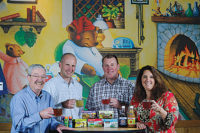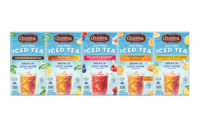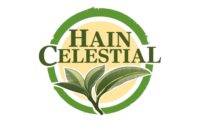Since its founding in 1969 by a group of entrepreneurs, Celestial Seasonings has remained situated against a backdrop of the Rocky Mountains in Boulder, Colo. A brand of The Hain Celestial Group, Melville, N.Y., Celestial Seasonings sources more than 100 botanicals from more than 35 countries around the world to create its high-quality teas. Its signature botanical ingredients, including chamomile, spearmint, peppermint, lemongrass and hibiscus, are purchased directly from the farmers and communities that grow them.
“Quality is extremely important to us, and the quality of our products is first and foremost tantamount in terms of everything that we’re trying to accomplish,” says David Ziegert, vice president and chief supply chain officer. “By being able to go directly to the source and work with those suppliers in key specific regions of the world, we’re able to source ingredients that have the taste and flavor profile specifically that we’re looking for in order to provide our consumers with the best taste we possibly can.”
For instance, the brand’s Zinger teas feature a tangy hibiscus flavor, says Charlie Baden, senior blendmaster. By working directly with the farmers who grow the herb, Celestial Seasonings can select hibiscus with the ideal flavor profile for its Zinger tea applications, he explains.
Although the founders originally dried handpicked herbs in a barn in Boulder to make its teas, today all of the company’s dry ingredients are processed and packaged in a 100,000-square-foot, fully automated facility that was built in 1990. Approximately 1.6 billion bags of tea are produced in the brand’s facility annually.
Its ready-to-drink Kombucha drinks and natural Kombucha Energy Shots are made using the company’s home-grown kombucha in a separate Celestial Seasonings facility. Additionally, its Enerji Green Tea Energy Shots and Sleepytime Snooz Natural Sleep Aid herbal supplement shots are co-packed. To ensure that its co-packed products meet its standards, Celestial Seasonings sends representatives to the site and establishes rigid manufacturing requirements, Ziegert says.
“It’s one thing for us to be there watching the machines running and the bottles being filled and everything else; it’s also extremely important to us that we’ve established a very sound process with a lot of … requirements along the way to ensure that at the end of the day we feel very comfortable with the products that somebody else is producing for us — especially since we’re putting the Celestial Seasonings name on it,” Ziegert says.
At its own dry tea facility in Boulder, all ingredients are referenced against the company’s gold standard to ensure consistency and quality, Baden says.
Approximately 40 percent of the ingredients arrive preprocessed according to the company’s specifications; the other 60 percent come in whole form and are processed at the Celestial Seasonings facility, he notes. To process the whole botanicals, employees at the plant clean them, cut them down to a specific particle size (versus grinding) and sift them.
“Particle size is a key contributor to the quality of our product and the consistency of our product,” Ziegert says. “When we have a consistent particle size, then the infusion of our product for our consumers when they’re steeping [the tea] for the same amount of time, the taste profile’s going to be very similar whether we’re making the product now or a year from now.”
After milling, the ingredients move on to the blending room where they are mixed thoroughly in a bin with other ingredients to get the desired flavor profile, Ziegert explains. Baden creates custom recipes for every order to ensure consistency, because the taste of the ingredients can vary by the location of the farms and weather conditions, he says.
“Hibiscus grown in North Africa, [for example,] if it doesn’t get enough rain it’s going to have a different flavor profile when it comes in,” he explains. “So my job is to make sure that I’m blending to stay consistent with what product development develops.”
After blending, the tea is passed into chutes that place portions of the product onto a roll of material that is doubled and cut to form a tea bag. The majority of the tea bags produced are Celestial Seasonings’ signature pillow bags; however, a small portion of the bags are used for foodservice and, therefore, have strings attached. By offering the majority of its tea bags without strings, tags or staples, the company saves approximately 3.5 million pounds of material annually from
going into landfills, Ziegert says.
The tea bags are placed into boxes that were previously formed and fit with a proprietary liner on the packaging line. A machine seals the liner inside the box, closes the box, and sends it to be wrapped in polypropylene film. Then the product is conveyed to a case packer that packages the units in corrugated boxes, which are then palletized using a robotic palletizer, stretch wrapped, and transported to the company’s nearby shipping and distribution facility. From there, the product is manually picked and either transported directly to retailers or sent via a distributor.
“In some instances, it makes more sense for us to work with distributors in order for us to get our products to a particular group or set of retailers, and in other instances it makes sense for us to work directly with the retailers,” Ziegert explains. “There isn’t a one-size-fits-all approach that we take.”
Regardless of the distribution strategy, the company keeps its inventory turns as high as possible, he says.
“We want to ensure that our inventory turns are kept very high because we want to be shipping very fresh product out to our retailer partners so that our consumers can be purchasing the freshest products from us,” Zeigert says.
Celestial Seasonings’ most popular package size is a 20-count box of tea, but it also offers a 40-count box, an 18-count sampler box, a 25-count foodservice box, and smaller-sized trial packets, Ziegert says.
Overall, the facility contains 10 manufacturing lines with five different packaging processes, including a foodservice machine, two packet machines, a sampler line and a bulk fill line, he says. The plant typically operates 24 hours a day, five days a week with three shifts; however, as demand for hot tea rises in the winter months, the facility increases production as needed to fulfill orders, he adds.
No matter how busy the facility is, Celestial Seasonings offers free plant tours to the public nearly every day of the year — except on major holidays — serving approximately 140,000 people each year. Showcasing its focus on authenticity and transparency, consumers are able to walk throughout the facility to see how the entire process works and learn more about the values, people and passion behind the company.








